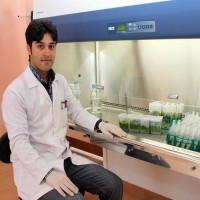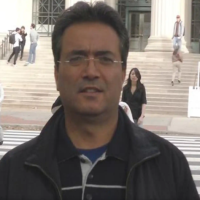Journal Boards
Editorial board
(CHIEF EDITOR)

(CHIEF EDITOR)

Hikmet Geckil is a Turkish academic who received PhD degree in Molecular Biology at Illinois Institute of Technology (Chicago, IL). A one year postdoctoral study at Ben Gurion University and a Fulbright Fellowship for 6 months at Harvard University and Massachusetts Institute of Technology (MIT) are among his science endeavors. His research is in the area of genetic engineering. His current affiliation is with the Department of Molecular Biology and Genetics at Inonu University.
Research in Geckil’s Genetic Engineering Laboratory is primarily based on the function of Vitreoscilla hemoglobin (VHb), the first prokaryotic hemoglobin. Using VHb, Geckil’s group engineered various bacteria for the purpose of producing industrially important products ranging from microbial fuels butanediol, acetoin to drugs used in Alzheimer’s and Parkinson disease (e.g., dopa, dopamine) and to asparaginase, an enzyme used in cancer chemotherapy. One of the recent endeavors of his laboratory is to dissect the anatomy of the SARS-CoV-2 Spike (S) protein and its physiological effects on cells. For this aim, his laboratory is studying the expression of S and its effect on cell physiology, using recombinant shuttle vectors created in his laboratory.
Geckil has published in the areas of biochemistry, biomedicine, and biotechnology, and has over 40 peer-reviewed publications. He is the Editor of “Virolojinin Prensipleri (Cilt I): Moleküler Biyoloji” and Co-Editor of “Virolojinin Prensipleri (Cilt II): Patogenez ve Kontrol“, the Turkish version of Principles of Virology (Volume I): Molecular Biology and Principles of Virology (Volume II): Patogenesis and Control, respectively. He is also the lead editor of the Moleküler Hücre Biyolojisi, the Turkish version of the highly acclaimed textbook “Molecular Cell Biology” by Harvey Lodish et al. He is also the editor of Biyokimya, the Turkish translated version of “Instant Notes in Biochemistry” by David Hames and Nigel Hooper. Dr. Geckil is also the author of two volume Biyokimya coursebook: Biyokimya I and Biyokimya II. He has serving on the editorial board of several international scientific journals, including the Biotechnology Journal (Wiley) and the Turkish Journal of Biology (TUBITAK).

Dr. Alevcan KAPLAN currently works at the Department of Pharmaceutical Botany, University of Dicle. Her current research interest is geared towards health sciences with a deep-rooted interest in biomedical sciences, biopharmaceutical sciences, bioinformatic, biomedicine, and natural products, medicinal chemistry, in vitro, models, functional foods, complementary and alternative medicines/ traditional medicines, ethnopharmacology, herbal medicines.

Dr. Abdul Bari Shah is a Research Professor at Korea University, specializing in natural products from plants, fungi, and bacteria. He completed his postdoc at the Natural Products Research Institute, Seoul National University, and holds a PhD in Organic and Natural Product Chemistry from Gyeongsang National University. His expertise includes NMR, LCMS, molecular networking, enzyme kinetics, antioxidant studies, cell culture, and antimicrobial assays. His current research focuses on bioactive small molecules from foods, microbes, probiotics, plants, and fungi, as well as developing dereplication methods and spectral databases. Dr. Shah is dedicated to advancing drug discovery and human health.

Dr. Muhammad Nauman Khan graduated with a BS (H) in Botany from the Department of Botany, University of Peshawar in 2018, followed by M.Phil in Botany from the Department of Botany, Bacha Khan University, Charsadda, Khyber Pakhtunkhwa in 2020. He earned his Ph.D. in Botany from the Islamia College Peshawar in 2024.
Currently, Dr. Khan serves as a Trained Graduate Teacher at the University Public School and College, University of Peshawar, a role he has held for the past two years. Prior to this, he worked as a Senior Teacher at the Agriculture University Public School, affiliated with the University of Agriculture, Peshawar.
Dr. Khan has authored over 120 peer reviewed international articles and contributed 30 book chapters published in reputed journals, with a cumulative impact factor of nearly 190. He has also published 25 abstracts in national and international conferences, workshops, and symposia, and has delivered numerous oral and poster presentations at international scientific gatherings. He was also Peer Reviewer in 35 different prestigious journals. He serves on the editorial board’s member of several journals, including:
• Ethnobotany Research and Applications (as Subject Editor)
• Eurasian Journal of Biological and Chemical Sciences (Editorial Board Member)
• Bulletin of Biotechnology (Editorial Board Member)
Additionally, Dr. Khan has personally reviewed 62 articles for various journals. He was a committee member for two major international conferences:
• 5th International Eurasian Conference on Science, Engineering, and Technology (EurasianSciEnTech 2024), held June 26–28, 2024
• 7th International Eurasian Conference on Biological and Chemical Sciences (EurasianBioChem 2024), held October 2–4, 2024
Dr. Khan is a lifetime member of:
• The Pakistan Botanical Society
• The Weed Science Society of Pakistan
• The Khwarizmi Science Society
